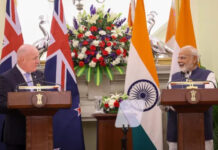Malden, MA, 28 February—International Physicians for the Prevention of Nuclear War (IPPNW) calls on India’s Prime Minister Narendra Modi and Pakistan’s Prime Minister Imran Khan to take immediate steps to deescalate the tensions in the disputed Kashmir region and to reduce the grave danger of nuclear war.
Recent acts of terror and military incursions in the long-disputed territory have exacerbated a conflict that threatens to plunge these two countries into a fifth and, conceivably, final major war since partition. Both countries have traded threats of nuclear retaliation. This is how nuclear war begins.
Dr. Ira Helfand, IPPNW’s American Co-President and author of Nuclear Famine: Two Billion People at Risk – Global Impacts of Limited Nuclear War on Agriculture, Food Supplies, and Human Nutrition, warned that an exchange of nuclear weapons between the two countries would not only quickly kill millions in the region, but would cause “an unprecedented global catastrophe.” Soot lofted into the upper atmosphere as a result of firestorms created by nuclear explosions would severely disrupt the global climate, leading to worldwide crop shortages and mass starvation affecting more than a quarter of the world’s population.
Since 1998, when the governments of India and Pakistan made their fateful decisions to test nuclear weapons, both countries have been engaged in a Cold War-style nuclear arms race. Mi
Dr. Arun Mitra, IPPNW’s Indian Co-President said, “India and Pakistan must end their border clash before it engulfs the world. Leaders from both sides must sit down to finally resolve their issues peacefully at the negotiating table and to take immediate steps to reduce and eliminate the threat that their nuclear weapons pose to all humanity.”
IPPNW is working in concert with the International Campaign to Abolish Nuclear Weapons, and with major global health federations, to advance the Treaty on the Prohibition of Nuclear Weapons. The “ban treaty” opened for signature at the United Nations in September 2017. It will enter-into-force once 50 nations have ratified or acceded to it. There are currently 70 signatories and 22 states parties. South Africa, the only country to have developed and later destroyed its nuclear weapons, is the latest to join the treaty only days ago.
“Until all the nuclear-armed states, including India and Pakistan, comply with the prohibitions spelled out in the ban treaty and eliminate their nuclear weapons,” Dr. Helfand said, “the entire world will remain at risk of a catastrophic nuclear war from which there will be no recovery.”
Contact: Blair Fitzgibbon, 202-503-6141, blair@blairfitzgibbon.com










